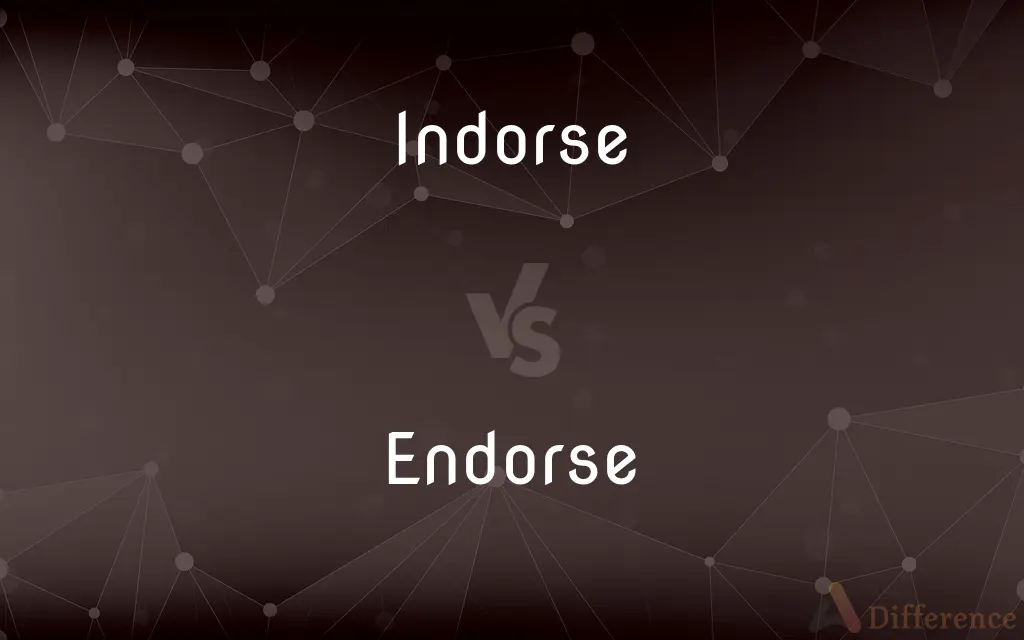Indorse vs. Endorse — What's the Difference?
By Tayyaba Rehman & Fiza Rafique — Updated on March 12, 2024
Indorse and endorse both refer to the act of supporting or approving something, but "endorse" is the more commonly used spelling in modern English.

Difference Between Indorse and Endorse
Table of Contents
ADVERTISEMENT
Key Differences
Indorse is an alternate spelling of endorse, originating from the Latin word "indorsare," which means to write on the back of something. Endorse, on the other hand, is used broadly in various contexts to signify approval, support, or recommendation of something or someone.
The distinction between indorse and endorse is largely historical and regional. While indorse may still appear in some legal documents and older texts, endorse is the term you are more likely to encounter in everyday usage, including business, marketing, and casual conversation. The shift towards the "endorse" spelling aligns with broader trends in English towards standardization and simplification of language.
In professional settings, especially those related to finance, banking, and law, the term endorse is universally understood and applied. For instance, when discussing the endorsement of checks or securities, the financial industry prefers the use of endorse. Similarly, in marketing, when talking about a celebrity endorsing a product, the spelling "endorse" is used.
Despite these differences, the essential meaning of both terms remains the same, focusing on the act of giving support, approval, or recommendation. The choice between indorse and endorse may depend on regional preferences, specific industry standards, or historical context, but in most modern contexts, "endorse" is the preferred spelling.
Comparison Chart
Definition
Alternate spelling of endorse, historically used to refer to signing the back of a document or check for transfer or validation.
Commonly used to signify approval, support, or recommendation of something or someone.
ADVERTISEMENT
Usage
Primarily in legal documents and older texts.
Broadly used across various contexts including legal, financial, and general language.
Context
More historical and regional use.
Standard form used in modern English for a wide range of applications.
Example in Finance
Indorsing a check (less common usage).
Endorsing a check by signing the back to authorize its transfer or to cash it.
Example in Marketing
Indorsing a product (historical/regional).
Endorsing a product through public support or recommendation.
Compare with Definitions
Indorse
Historical term for approval.
The document was indorsed by all parties involved.
Endorse
Modern term for approval or support.
The celebrity endorsed the new product line.
Indorse
Less commonly used spelling.
You might still find indorse in some legal documents.
Endorse
Widely used in various contexts.
Endorse is common in financial, legal, and marketing sectors.
Indorse
Reflects older English usage.
Historical texts often use indorse to mean endorse or support.
Endorse
Implies giving support or recommendation.
The organization endorsed the candidate for office.
Indorse
Can signify signing on the back.
The term was originally used to describe the act of signing the back of a check or document.
Endorse
Used for signing checks.
Endorsing a check allows its transfer or encashment.
Indorse
Sometimes seen in legal contexts.
Legal forms from previous centuries frequently used indorse.
Endorse
Reflects current English usage.
Endorse is the preferred spelling in contemporary language.
Indorse
Of documents or cheques
Endorse
To express approval of or give support to, especially by public statement; sanction
Endorse a change in policy.
Endorse a political candidate.
Indorse
Variant of endorse.
Endorse
To recommend (a product), often in exchange for payment, as in an advertisement.
Indorse
Alternative form of endorse
Endorse
To write one's signature on the back of (a check) to obtain the amount payable or to make the amount payable available to a third party or to the bearer.
Indorse
To cover the back of; to load or burden.
Elephants indorsed with towers.
Endorse
To write one's signature on the back of (an instrument) to transfer the rights available under that instrument to another party.
Indorse
To write upon the back or outside of a paper or letter, as a direction, heading, memorandum, or address.
Endorse
To place (one's signature), as on a contract, to indicate approval of its contents or terms.
Indorse
To write one's name, alone or with other words, upon the back of (a paper), for the purpose of transferring it, or to secure the payment of a note, draft, or the like; to guarantee the payment, fulfillment, performance, or validity of, or to certify something upon the back of (a check, draft, writ, warrant of arrest, etc.).
Endorse
To acknowledge (receipt of payment) by signing a bill, draft, or other instrument.
Indorse
To give one's name or support to; to sanction; to aid by approval; to approve; as, to indorse an opinion.
Endorse
To express support or approval, especially officially or publicly.
The president endorsed John Smith as senator.
Indorse
Be behind; approve of;
He plumped for the Labor Party
I backed Kennedy in 1960
Endorse
To write one's signature on the back of a cheque, or other negotiable instrument, when transferring it to a third party, or cashing it.
Indorse
Give support or one's approval to;
I'll second that motion
I can't back this plan
Endorse a new project
Endorse
To give an endorsement.
Indorse
Guarantee as meeting a certain standard;
Certified grade AAA meat
Endorse
(medicine) To report (a symptom); to describe.
Endorse
(heraldry) A diminutive of the pale, usually appearing in pairs on either side of a pale.
Endorse
Same as Indorse.
Endorse
A subordinary, resembling the pale, but of one fourth its width (according to some writers, one eighth).
Endorse
Be behind; approve of;
He plumped for the Labor Party
I backed Kennedy in 1960
Endorse
Give support or one's approval to;
I'll second that motion
I can't back this plan
Endorse a new project
Endorse
Guarantee as meeting a certain standard;
Certified grade AAA meat
Endorse
Of documents or cheques
Common Curiosities
Can I use indorse in modern documents?
While "indorse" is understood, it is recommended to use "endorse" in modern documents for clarity and consistency.
Is there any legal difference between indorse and endorse?
No, there is no legal difference between the terms; "endorse" is simply the more commonly used form in modern English.
Is one spelling more correct than the other?
"Endorse" is considered the standard spelling in contemporary English, but both spellings are technically correct.
Has the meaning of these terms evolved over time?
The core meaning has remained the same, but "endorse" has broadened to include various forms of approval and support beyond the original financial context.
Are there industries that still prefer indorse over endorse?
Some legal and historical contexts might still use "indorse," but "endorse" is preferred in most industries today.
Do indorse and endorse have the same pronunciation?
Yes, both words are pronounced the same way despite their different spellings.
Why has endorse become more popular than indorse?
"Endorse" has become more popular due to standardization in language usage and the tendency towards simplification in English spelling.
How do I know which term to use?
Use "endorse" for modern communication and documents. "Indorse" is primarily of historical interest or in very specific legal contexts.
Can a document be both indorsed and endorsed?
In contemporary usage, you would typically see "endorsed" as the preferred term for any form of approval or support, making the distinction unnecessary.
Are there other examples of English words with such variations?
Yes, English contains many words with variations in spelling, often reflecting historical, regional, or dialectical differences, such as "color" vs. "colour" or "theater" vs. "theatre."
Share Your Discovery

Previous Comparison
Haberdashery vs. Millinery
Next Comparison
Dirt vs. SandAuthor Spotlight
Written by
Tayyaba RehmanTayyaba Rehman is a distinguished writer, currently serving as a primary contributor to askdifference.com. As a researcher in semantics and etymology, Tayyaba's passion for the complexity of languages and their distinctions has found a perfect home on the platform. Tayyaba delves into the intricacies of language, distinguishing between commonly confused words and phrases, thereby providing clarity for readers worldwide.
Co-written by
Fiza RafiqueFiza Rafique is a skilled content writer at AskDifference.com, where she meticulously refines and enhances written pieces. Drawing from her vast editorial expertise, Fiza ensures clarity, accuracy, and precision in every article. Passionate about language, she continually seeks to elevate the quality of content for readers worldwide.















































